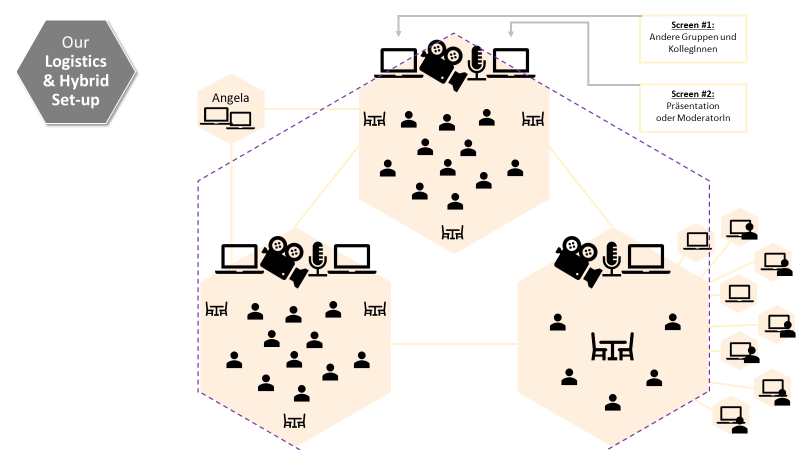
“Changing the mindset in teams is also successfully possible with a hybrid set-up. The virtual coordination especially requires clarity and structure. We will show you how you can also implement virtual and hybrid trainings using a best-practice story!”
About the author:
Nicole Altenberger, Training & Development Consultant at MDI, shares with us her work experiences with L&D in international companies.
Initial situation
At the beginning of the year, a large customer had decided to change the focus of a team (approx. 25 people) and to encourage a mindset change from problem to solution orientation. The general goal of becoming a high performing team was in the focus and was to be implemented through individual measures (conflict resolution, brainstorming, out of the box thinking, customer focus, prioritization, …) The training was designed to take place in one large seminar room, with two smaller rooms to meet the individual needs of the participants and to provide enough space for exchange.
… and then came Corona.
Like so many other companies, we were faced with the question: what are we postponing, knowing that no one can see into the future and anticipate when the situation will “normalize” again. In contrast to this, however, there are always topics and contents that have an urgency and importance – which should therefore definitely be held within a certain period of time.
After all, how important is a training session if you postpone it several times?
– this is a key question that every company should be asking itself right now.

Environment meets mind- and skillset – Shaping and leading sustainable dream teams Vol. 01 How can you lead and support teams on the way to the IDEAL Mindset and IDEAL Skillset and ensure the appropriate ENVIRONMENT for this?
How to implement a virtual hybrid training – How does it work?
Together with the customer we went on a creative search for solutions and created an interactive virtual format, in which the exchange among each other, but also the setting of impulses by the expert is not neglected. The aim was to strengthen the team both virtually and hybridly in the long term.
The hurdle here was the preparation and infrastructure. Since there was a group of 25 people, a total of 3 rooms were needed – 2 physical (in an chair circle in a hotel) and 1 virtual room, with the participants joining in virtually. Additional laptops had to be set up to ensure that the participants could be seen – but also heard – from all sides. With optimal support on site, we scheduled technical rehearsals in advance to test the sound quality from different angles in the room. With joint effort, the first major hybrid training was created – with amazingly positive results.
3 Key Findings
Planning is half the battle
A hybrid training needs clarity and structure in the preparation. Since contact persons have to be coordinated virtually and on site, a meticulous agenda is advantageous.
Coordination Meetings
should be divided into: Focus Content and Focus Technical Support – as this guarantees that all success components are aligned. A visualization of the hybrid set-up is also very helpful
Clear rules
- Switch the camera on as often as possible.
- Do not mute as often as possible.
- Mute if necessary.
- In question-answer and interactive sessions, the moderator “moves” around the physical and virtual rooms to “collect” questions;
- encourage participants to speak proactively.
- Stick to the agenda and start punctually after work sessions or breaks to support effective hybrid collaboration.
- Photo documentation of group work on flipcharts and/or worksheets by the group leader.
- Please keep the Covid-19 regulations in physical meeting rooms, in mind.





